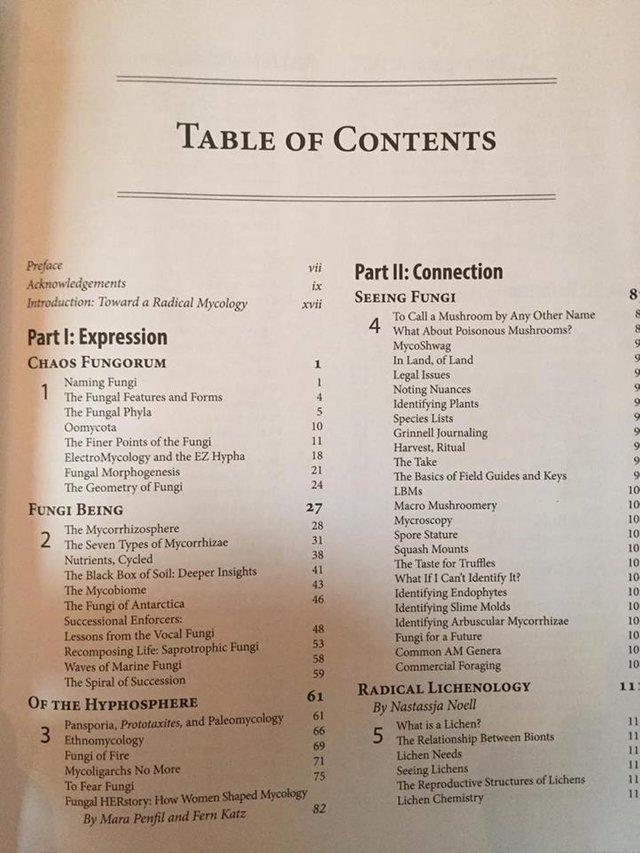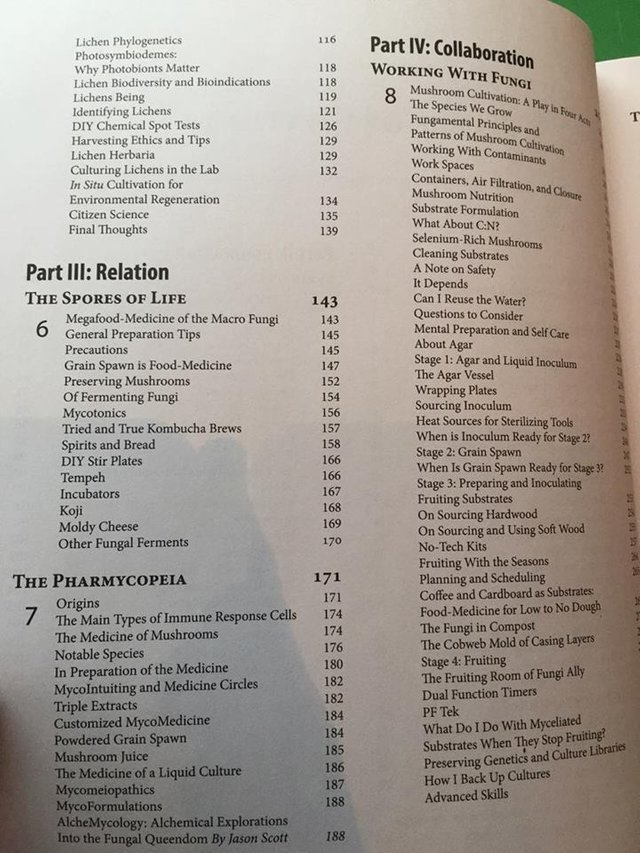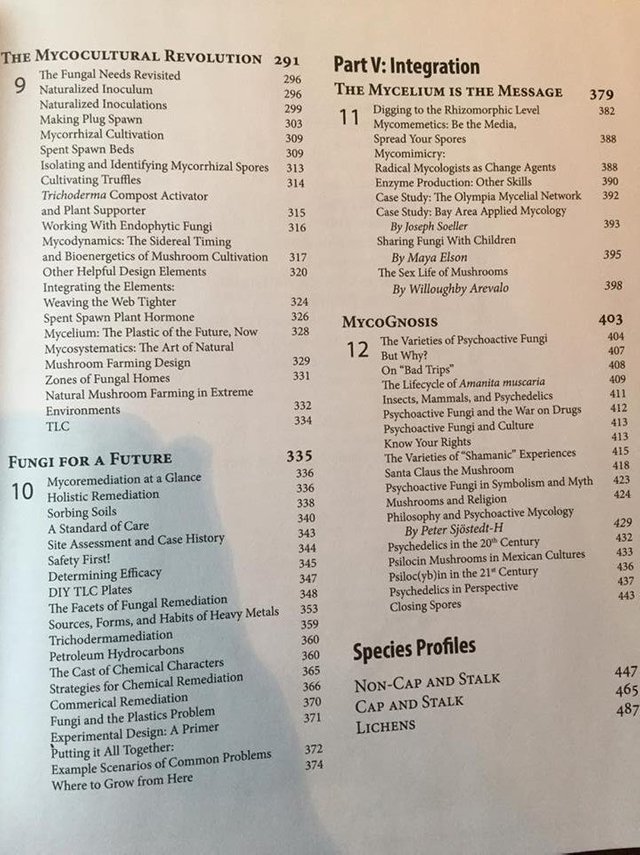Itchykitten's bookshelf: Radical Mycology
Today we're going to take a look at Radical Mycology, the cream top top for any Mycophile!
Radical Mycology
by Peter McCoy
A gorgeous and insanely thorough work on the world of mycelium and mushrooms. This massive 700 page volume covers a HUGE amount of ground. I read many chapters front to back, and skipped over others. If you have even a cursory interest mushrooms, this book will blow your brains out. I sort of feel like Peter has transcended into a religious figure for me after reading...Here's a quick excerpt about the state of the science lately.
Of the 15 million species estimated to live on Earth, as many as 6 million may be a fungus. Of these, only 75,000 or around 1.5% of all fungi have been classified to date. Few of these have been studied beyond their basic forma dn function, and less than 100 species have been significiantly integrated into human activities. Only about two dozen are commonly cultivated and just seven mushroom species grown on a mass scale, a small reflection of our limited understanding of their ways and offerings.
Two facts become quickly apparent for anyone studying Mycology: 1) fungi are incredibly important and fascinating and 2) nobody knows about number 1. For no clear reason, fungi have been largely dismissed amongst westerners--a mere oddity to be feared and forgotten. Whereas plant growth and the concept of "germs" and bacteria are taught to children at a young age, mycology is essentially absent from grades K-12 and above. Even at the graduate level, when fungi are presented in natural science courses it is often with a cursor assessment that emphasizes their misunderstood actions as "pathogens". With minimal representation in the media, this mycological knowledge gap tends to remain in place outside of one's schooling, leaving many westerners uninformed and unaware of the untold potential that mycology offers. Thus, as those in the west never ear, learn, think, or talk about fungi, these organisms become increasingly easy to ignore and buried beneath layers of maligned mystery.
In the academic world, this problem is almost worse. Paradoxically, fungi are recognized for their ubiquity and importance amongst biologists, and yet mycology has remained a "neglected mega-science" throughout it's short 250-year history. Whereas most university departments are under constant threat of budget cuts, the small and scarce mycology departments in western universities more often face imminent closure.
Table of Contents



Radical Mycology covers a big spectrum from academic to practical mushroom cultivation guides. At this point it's the closest thing to a mushroom bible I've ever seen. Peter McCoy also offers lots of workshops as he travels around, you can see where he's at on his website.

Thankyou for your support and thoughts! Wild Earth is a series about strange and wonderful aspects of the nature world. I will continue publishing the Story of Money series as time goes on, also feel free to check out my Exercise Anywhere series for those of you who like to get a workout in unconventional(yet practical!) ways. If you've enjoyed this post, please upvote!
Wild Earth
#1 -Flatworms Can Store Memory Outside Their Brains
#2 - The Untold Majesty of Flowers
#3 - Dog People, Language, and Death
The Story of Money
The Story of Money 1: Introduction
The Story of Money 2: Work, Wage, and Labor
The Story of Money 3: The Myth of Barter
The Story of Money 4: Markets, Metals, Coins, and Military

Looks like a very interesting read.
Particularly the fact that the final chapter is title "MycoGnosis." I'd never heard that term, so I googled it, and found that it is a relatively commonly used term – along with the terms "mycophile," "mycophage," and "mycologist." :-)
Much thanks for the interesting post. Keep up the good work, and Full Steem Ahead.
thanks brother!
Ah - now I see why you were asking me about mushrooms. Clearly you've read a lot about them.
This looks like the only mushroom book you really need, but I have to say I like the cover of this one even more:
That's a fantastic book!!! Very different from each other, but both are awesome :P David Arora is the shit, dude is hilarious and wonderful.
How funny that you were familiar with the book already! I'd only ever seen the cover. It came into the bookstore where I was working and everyone had a good laugh at it. Arora definitely looks like someone I'd like to hang around with.
Fascinating stuff @itchykitten this looks like a great book! I find the lifecycle of mycelium to be fascinating. Due to the fact that the vast majority of the mycelia is actually found underground (perhaps stretching for many miles) most people are unaware that they are in fact some of the largest living organisms on the planet. They may remain underground (not dormant) for literal generations before fruiting. In the UK there have recently been rare mushrooms observed for the first time in living memory. This begs the question as to how they arrived or indeed whether they have always been here but have just chosen this time to fruit? Some say certain mushroom spores may have even originated from space! I find the entire subject fascinating and this looks like a great book that needs to be added to my collection, thanks for sharing :)
Wow weird, I haven't heard anything about that? Any links for me to check out?
I KNOW!!! It's freakin awesome, big mycelial brain tissue of the planet. I want to plug myself into it someday like Bran from GoT. :P
:"Big mycelial brain tissue of the planet" Now you're talking my friend :D
I've been looking for the same article I read but I can't find it as I read it in countrylife in the hairdressers! But whilst looking I've found some more really interesting ones. Especially when you take into consideration that in terms of the natural world the UK is one of the most mapped and logged places in the world.
1)Recorded just once before: Here
2)Really interesting new species in the UK Here
3V rare UK truffle Here
There are actually a fair few brand new species popping all over the world, really interesting subject.
Nice!!! thanks PF
Hey @itchykitten no problem .. heard this and thought of you :)
@minnowpondblue has voted on behalf of @minnowpond.
If you would like to recieve upvotes from minnowponds team on all your posts, simply FOLLOW @minnowpond.
i upvoted ur post pls follow and upvote my post too
@francis00000032
This wonderful post has received a bellyrub 25.25 % upvote from @bellyrub thanks to this cool cat: @itchykitten. My pops @zeartul is one of your top steemit witness, if you like my bellyrubs please go vote for him, if you love what he is doing vote for this comment as well.
@steem-marketing has voted on behalf of @minnowpond.
If you would like to recieve upvotes from minnowponds team on all your posts, simply FOLLOW @minnowpond.
@originalworks
The @OriginalWorks BETA V2 bot has upvoted(1%) and checked this post!
Some similarity seems to be present here:
https://www.scribd.com/document/336335837/Introduction-Toward-a-Radical-Mycology
This is an early BETA version. If you cited this source, then ignore this message! Reply if you feel this is an error.
This post has received a 9.59 % upvote from @booster thanks to: @itchykitten.
Saluton @itchykitten. This is quite a piece of good lecture before going to bed. I have to come back. I like the idea of seeing language as not a tool. Just this evening I thought about it, as I was pondering why Esperanto never really succeded. Maybe because of that it was from the beginning a more or less complete tool, ready to be used to linguistically bridge different nations on earth. But on the other hand does a common auxilliary language need to be more than a tool? What do you think? By the way do you speak Tsėhésenėstsestȯtse?
This is wonderful! Thank you! 👍